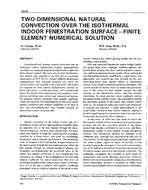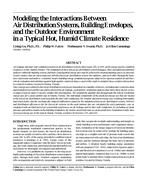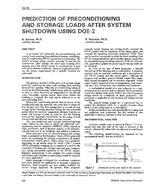A particle separation theory for uniflow aerodynamic dedusters was developed. Particle cut-size and separation efficiency were affected by many factors, such as chamber configuration, particle characteristics, and airflow patterns. A prototype aerodynamic deduster was developed based on the analysis of particle behavior in uniflow conditions. It was found that the vortex chamber length, annular tunnel space between the inside and outside cylinders, vane angle, tangential and axial air velocities, and turbulence intensities have effects on the particle cut-size and separation efficiency. A particle counter was used to measure dust concentrations upstream and downstream of the deduster. Particle separation efficiencies agreed well between the predicted and measured values. The study showed that a uniflow deduster could be effective in separating dust particles from an airstream. Further studies are needed to optimize the deduster configuration and evaluate the effect of turbulence intensity on particle separation.
Units: Dual
Citation: ASHRAE Transactions, 1998, Vol 104, pt. 1A, San Francisco
Product Details
- Published:
- 1998
- Number of Pages:
- 6
- File Size:
- 1 file , 130 KB
- Product Code(s):
- D-7827


